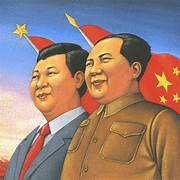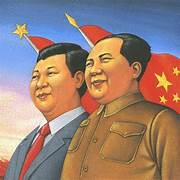Schmittian Moments 4


Last week I met a Marxist who claimed that it was when he visited China in the early 1970s that he became a Marxist philosopher. This was a striking thing to say. Most Marxists I know tend to distance themselves from the Soviet and Maoist regimes, saying that these are at best distortions of Marxism, at worst nothing to do with Marx at all. Reading serious Marx scholars like Brian Leiter and Jamie Edwards makes it clear that this is the position of many who continue to urge us to take Marx seriously in our post-Cold War context, particularly much of Marx's critique of capitalism and his theory of ideology. The fact that this philosophy guy found late Maoist China more appealing than Western liberal state capitalism surprised me. (Another interesting feature of his thinking was that he made much of the Hegelian dialectic in Marxism too, another feature serious Marx scholars tend to eschew these days, if the recent Leiter/Edwards scholarship is indicative of good contemporary readings.) The discussion that followed his surprising admission led to speculations regarding China then and now. As always seems to happen when I challenge theological Marxists, I found myself having to defend myself from accusations of being a right-wing defender of state capitalism. My push-back was that Marxism wasn't the only game in town when it came to left-oriented politics, and an attack on a particular Marxist position wasn't a de facto endorsement of capitalism. Of course such an argument is never convincing to the faithful, who continue to see you in terms of false consciousness, rather like my evangelical Christians see me via the lens of sin! But that wasn't what interested me so much as the fact that people so much smarter than me could find ways to support what to me looked like an unsupportable regime via a theological, i.e., faith-based, ideology. I guess faith's one of the key components that characterises all theocratic regimes, because by the end of the evening I left feeling that I'd been talking to representatives of the Marxist faith community. In light of all this, I wrote this brief note to myself for further reflections later, applying a Schmittian lens to China in an attempt to say why I don't find the China of Mao, nor Xi, attractive.
China in the 1970s and China today represent two distinct instantiations of Schmittian political logic, both centered around sovereign decision and ideological unity, but differing markedly in structure, rhetoric, and practice. In terms of Carl Schmitt’s framework, where sovereignty is defined by the power to decide on the exception, and political order is grounded in a concrete friend–enemy distinction, the China of the 1970s may in fact be seen as a more extreme and unmediated realization of Schmitt’s political theology, whereas contemporary China offers a more institutionally stabilized and globally responsive version of the same principles. In the 1970s, China was in the late stages of the Cultural Revolution (1966–1976), a period of radical ideological purging, intense personalist rule under Mao Zedong, and the near-total subsumption of law and culture under politics. The state was in a permanent state of exception, all bureaucratic institutions, including legal mechanisms, were subordinate to the political will of the Chairman. Law, in any institutional sense, was virtually nonexistent. The friend–enemy distinction was violently direct, class enemies, intellectuals, landlords, and those accused of harboring “bourgeois” tendencies were publicly denounced, imprisoned, or killed. Even Party officials themselves were subject to purges. Sovereignty was not institutional, it resided entirely in Mao as a charismatic leader, embodying what Schmitt called the "personal decision" that overrides proceduralism.
As such, 1970s China was a raw Schmittian state, politics was theology, and enemies were existential. Culturally, the Schmittian logic was deployed in the extreme. All cultural production was treated as political weaponry. The “Eight Model Operas” dominated the arts, and all literature, film, and education had to glorify the revolution and vilify class enemies. Culture was not just subordinated to politics, it was politics. The space for pluralism, ambiguity, or neutrality was utterly closed. This perfectly enacts Schmitt’s belief that the liberal notion of culture as autonomous is a fiction, in Maoist China, culture was absorbed entirely into the sovereign decision about what kind of community the people should become. In contrast, today’s China under Xi Jinping still follows a Schmittian logic, sovereignty above law, ideological unity over pluralism, the priority of decision over norm, but in a more systematically bureaucratized and internationally strategic form. The law exists, but as an arm of sovereign authority. Courts function, but their independence is always conditional on Party directives. There is space for market activity, limited legal redress, and even pockets of intellectual life, as long as they do not cross red lines.
The state of exception is invoked selectively rather than continuously, in Xinjiang, in Hong Kong, during COVID-19 lockdowns, or against perceived digital dissent. Culture is controlled, but in subtler ways, censorship and “positive energy” campaigns are used to engineer harmony rather than enforce mass mobilization. Schmitt’s friend–enemy distinction still defines political identity, but enemies are now framed less as “class enemies” and more as foreign saboteurs, separatists, corrupt officials, or “Western ideological infiltrators.” The battle is not against landlords or capitalists (many now thrive under the Party’s patronage), but against forces seen to challenge national unity or Party legitimacy. Xi’s China is more stable, less chaotic, and more globally integrated than Mao’s, but in Schmittian terms, it is not less political. Rather, the political has become more controlled, technocratic, and diffuse, less revolutionary, but still structured by the logic of sovereign decision.
Whether this evolution is “better” or “worse” depends on the criteria one uses. From a Schmittian perspective, Maoist China may be more “pure,” politics as the absolute ground of all order, law as suspended, and the friend–enemy distinction existential and total. Today’s China is more pragmatic, institutionalized, and strategic, but arguably still Schmittian in structure. It demonstrates that Schmittian politics does not require the chaos of permanent revolution, it can operate in modern, post-revolutionary regimes where sovereign decision is bureaucratized and cloaked in the language of stability, prosperity, and national rejuvenation. From a liberal or humanist perspective, the current system may appear less brutal, but its mechanisms of control, digital surveillance, ideological education, censorship, and targeted repression, remain deeply illiberal. It is a less violent but more durable form of the same political theology, one in which the political decision precedes the legal order, and the meaning of culture is derived from the sovereign’s conception of unity.
Thus, China today is not a post-Schmittian state, it is a more refined Schmittian one. Schmitt’s definition of sovereignty, “he who decides on the exception,” maps closely onto the political function of the CCP. In China, law is explicitly subordinated to the political authority of the Party. The Constitution enshrines the leadership of the CCP, not as one branch among others, but as the condition of legality itself. Courts do not act independently, they interpret and apply the law in line with Party policy. In this way, legality is not a self-standing order of norms, but an instrument of the Party’s decisions. This is not a distortion or corruption of the system, it is the system. The Party does not merely rule through the law, it rules above it, revealing the Schmittian truth that law depends on a prior decision about who rules and under what conditions. This is most evident in the political logic of the “state of exception.” Schmitt argued that the exception is where the real power of the sovereign emerges, unbound by law in order to preserve order.
In China, the response to perceived threats, be it the Uyghur population in Xinjiang, pro-democracy movements in Hong Kong, or domestic dissent, has involved precisely such exceptions. The mass internment of Uyghurs under the guise of “re-education,” the National Security Law imposed on Hong Kong, and the routine disappearance or silencing of dissenting intellectuals or activists, all bypass ordinary legal procedures. These are not failures of the rule of law, they are manifestations of the Schmittian principle that law can be suspended by the sovereign in defense of the political order. The Chinese state does not hide this logic, it asserts it as necessary for unity and “stability.” Schmitt also emphasized the friend–enemy distinction as the foundation of the political. The Chinese state has increasingly relied on this distinction both domestically and internationally. Internally, political dissent is not treated as a matter of pluralism or competing interests, but as evidence of enmity, of a failure to align with the Party’s conception of national identity.
Xi Jinping’s cultural policy promotes “socialist core values” and the “Sinicization” of religion, marginalizing any ideology or practice that does not affirm the Party’s role as the embodiment of national unity. Dissent becomes not just disagreement, but disloyalty. Externally, China frames its global position increasingly in oppositional terms, against “Western hegemony,” “hostile foreign forces,” and what it calls the moral hypocrisy of liberal democracies. This mirrors Schmitt’s understanding of politics as rooted in existential conflict and the need for a sovereign actor to define the identity of the political community through such distinctions. In terms of culture, Schmitt was suspicious of liberal culture’s attempt to universalize aesthetic or moral values and separate them from political order. He saw culture as ultimately dependent on a concrete political decision about the values a community affirms. Chinese cultural policy reflects this, cultural production, education, and media are expected to serve political ends. The arts, literature, and internet culture are mobilized to promote “positive energy,” a term Xi uses to signal content that supports Party values, national pride, and social harmony. Censorship is not framed merely as a legal or moral matter, but as a political act in the service of cultural unity. The regime does not pretend to neutrality, it insists that culture must serve the people, and “the people” are defined by the Party.
In this way, Schmitt’s idea that liberal neutrality is a fiction, and that every order is founded on a concrete political decision, finds a real-world embodiment in Chinese cultural governance. Moreover, the recent abolition of term limits and the concentration of power in Xi Jinping echoes Schmitt’s critique of liberal proceduralism. Schmitt believed that the liberal state’s attempt to separate law from politics led to paralysis, especially in times of crisis. In contrast, he admired strong decisionist regimes that could assert sovereign unity. Xi’s leadership follows this decisionist model. The centralisation of authority is justified not by legalism or democratic legitimacy, but by the necessity of a unified political will to ensure China’s rejuvenation. The Party positions Xi as both the guardian of historical continuity and the agent of national destiny, echoing Schmitt’s notion of the sovereign as the one who can decide and give form to the political community.
The philosopher I met did not seem at all uncomfortable with this state of affairs when asked. That some of the left has been captured by this theological Marxism (in contrast to the non-Marxist left, and non-theological Marxist left) has always struck me as weird, even though most of the ones I know personally are in most other respects decent, smart, and reasonable people. Religion sure is strange!
上周我遇到一位马克思主义者,他说自己在 1970 年代初访华后才成为马克思主义哲学家,这话相当惊人。我认识的大多数马克思主义者都与苏联和毛主义政权保持距离,认为这些政权充其量是对马克思主义的扭曲,甚至与马克思根本无关。阅读像 Brian Leiter 和 Jamie Edwards 这样的严肃马克思学者,可以清楚看到许多人主张我们在后冷战时代仍应认真对待马克思,特别是他的资本主义批判和意识形态理论。这位哲学家相比西方自由资本主义,更认同晚期毛泽东时代的中国,这让我大为惊讶。另一件颇有意思的是,他特别强调马克思主义中的黑格尔辩证法,而这是很多严肃马克思学者如今往往避免的内容,若从 Leiter/Edwards 的研究来看便可印证。随后关于中国当时和现在的讨论便随之展开。每当我批评那些神学派马克思主义者时,总感觉自己不得不为右派国家资本主义辩护,我的回应是,批判某种马克思主义并不意味着自动支持资本主义。自然这样的辩护无法打动那群信徒,他们将你视为“虚假意识”的代言,就像福音派基督徒会透过“罪”的镜头看我。但令我更感兴趣的是,这些比我聪明得多的人,竟能通过一种神学式、信仰基础的意识形态,为我看似站不住脚的政权辩护。我想“信仰”是所有神权政体的核心,到最后我觉得自己仿佛与一群“马克思信仰社区”的代表对话。鉴此,我写下这段备忘,以后尝试用施米特(Schmitt)的视角来说明为何我觉得毛时代与习时代的中国都不具吸引力。70 年代的中国与今日的中国,是两种截然不同的施米特式政治逻辑体现,它们都强调主权决定与意识形态统一,但在结构、修辞与实践上迥异。按照卡尔·施米特的框架,主权即决定例外状态的力量,政治秩序建立在“友—敌”区分上,70 年代的中国或许更极端、更直接地呈现出施米特的政治神学,而当代中国则是同样原则下更制度化、更全球回应性的版本。70 年代,中国正处于文化大革命后期,那是一个激进思想清洗时期,毛泽东个人权威高度集中,法律和文化几乎完全被政治吞没。国家处于常态例外状态,所有官僚机构与司法机制都服从于最高领导人的政治意志,法律在制度意义上几乎不存在。“友—敌”对立极为直接,阶级敌人、知识分子、地主及被指有“资产阶级”倾向者遭到公开批斗、监禁或处决,甚至党内官员也不例外。主权不是制度性的,而完全依附于毛的个人魅力,即施米特所言“个人决定”凌驾于程序之上。因此,70 年代的中国是原始的施米特国家,政治即神学,敌人即生死对立。在文化层面上,施米特的逻辑也被极端应用。所有文化产品被视作政治武器,样板戏主宰艺术领域,文学、电影、教育都必须颂扬革命、丑化阶级敌人。文化不被政治支配,而是政治本身。这完美契合施米特对自由主义文化“自治”理念的批判,在毛时代,文化完全融入了关于国家理想的主权决定之中。相比之下,当代中国仍然沿用施米特逻辑,主权凌驾法律,意识形态统一优先于多元,决定重于程序,但在更制度化、更国际化的框架内运作。法律依旧存在,但只是服从于主权当局的工具。法院有运作,但其独立性始终受党政指令制约。市场活动、有限法律救济、知识空间依然存在,只要不触碰红线则可容忍。例外状态被选择性地调用,比如对新疆、香港的治理、疫情封控、数字异议等。文化被更隐性地掌控,通过审查和“正能量”推广来塑造和谐,而非大规模动员。施米特的“友—敌”区分仍决定政治身份,但敌人不再是阶级敌人,而是“外国破坏势力”“分裂者”“腐败官员”或“西方意识形态渗透者”。斗争不再针对地主或资本家(许多资本家现由党恩庇护),而是那些挑战民族统一或党的合法性者。习近平时代的中国更稳定、更制度化、更融入全球,但在施米特意义上仍高度政治化。政治已变得更可控、更技术化、更分散,是一种不那么革命但依然受主权逻辑驱动的秩序。从施米特角度评判,“更好”或“更坏”取决于衡量标准。70 年代或许更“纯粹”,政治是所有秩序的绝对基础,法律被暂停,敌我对立是生死攸关。今日中国则更务实、更制度化、更战略化,却依然在结构上延续施米特模式。它证明施米特式政治不必伴随永久革命的混乱,在后革命体制中也可运作,前提是主权决定被制度化并以“稳定繁荣”为旗帜。从自由主义或人文主义视角看,当代体制或许不如昔日残酷,但它的控制机制—数字监控、意识形态教育、审查和有针对性的镇压—依旧深具非自由性质。这是一种更为持久的政治神学,其中政治决定凌驾法律秩序,文化意义由主权构想定义。因此,今日的中国并非“后施米特”国家,而是一种更加精炼的施米特国家。施米特对主权的定义——“决定例外者”——与中共的政治职能高度契合。在中国,法律明确服从于党的政治权威,宪法将中共领导写入根本,法院并非独立,而是在执行党政策的同时解释法律,由此法律不再是自洽规范秩序,而是党的决策工具。这并非制度异化,而是制度本身,中共统治不只是通过法律,更凌驾法律,从而彰显出施米特所言法依赖于关于谁来统治的先决政治决断。在应对例外状态方面,施米特主权逻辑展现得尤为明显。在所谓“威胁”面前——新疆维吾尔人、香港民主运动、国内异议——国家发动全面控制,包括大规模再教育集中营、香港国安法、生者失踪或知识分子被噤声。这些并非法律失败,而是施米特原理的体现,即为了政治秩序主权可暂停法律。国家不隐瞒这种逻辑,反而主张其必要性,为维护“稳定统一”赋予合法性。施米特也强调“友—敌”区分是政治的基础。当代中国将该区分应用于国内外政策。国内,异议被视为敌意,是对党与民族身份的失败认同。习近平推动“核心价值”和宗教“中国化”,对于不承认党的统治的思想被排斥,异议者不仅仅是观点不同,更被视为不忠。国际上,中国将自身定位在“西方霸权”“敌对外力”“自由民主虚伪”的对抗中。这完美体现了施米特眼中政治植根于存在主义冲突,而主权则定义谁属于政治共同体。在文化层面上,施米特警觉自由主义文化试图推广普世价值,将其与政治秩序割裂。他认为文化最终依赖于政治决断。中国文化政策反映了这一点,文化生产、教育和媒体必须为政治服务。文学、艺术、网络文化被动员以宣扬“正能量”,即支持党的价值、民族自豪、社会和谐。审查不仅是法律或道德问题,而是政治行动,旨在实现文化统一。国家不伪装中立,而明确主张文化必须为人民服务,而“人民”则由党定义。如此,施米特认为自由主义文化中立是虚构,而任何秩序都是基于具体的政治决断,在现实中国得到了体现。废除任期限制、权力高度集中于习近平,也呼应了施米特对自由程序主义的批判。施米特认为自由国家将法与政治分离会导致危机下的瘫痪,他更欣赏那些能在危机时刻彰显主权统一的决断政体。习时代带来的是一种决定主义模式,权威集中不是出于法律或民主正当,而是出于建立统一政治意志实现民族复兴的需要。党将习近平塑造成历史延续的守护者与民族命运的执行者,正契合施米特对主权者的理解。当被问及时,那位哲学家对此毫不迟疑地表示认同。左派中许多人已被这种“马克思神学主义”俘获,这让我觉得有些奇怪,即便我私下认识的大多数他们都相当正直、聪明、理性。宗教确实很奇怪。